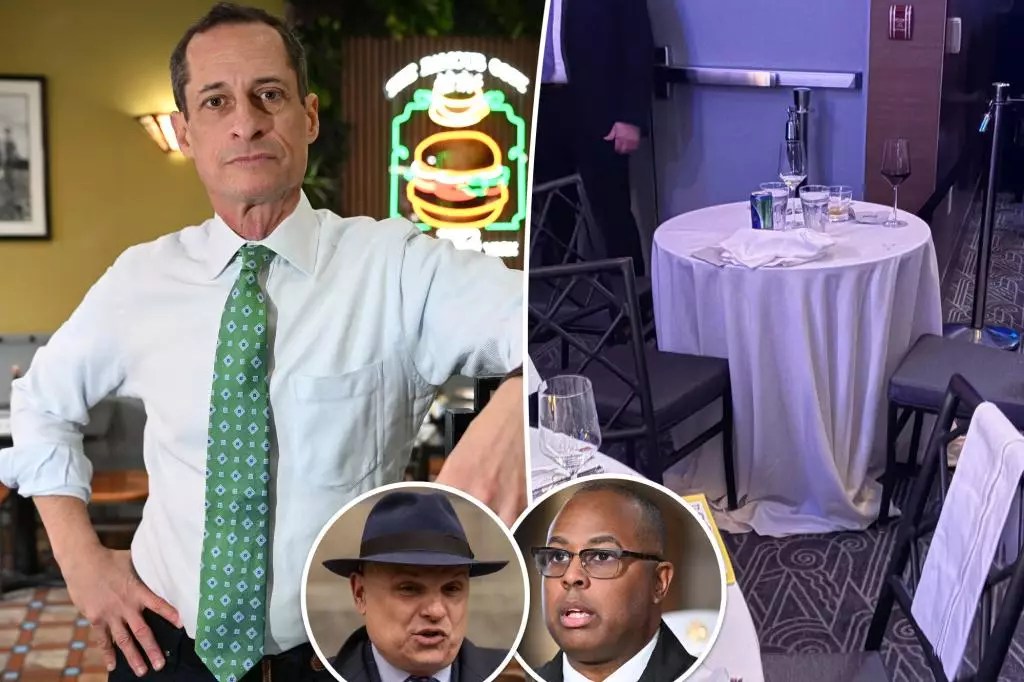In the grand tapestry of New York’s political elite, social gatherings serve not just as networking opportunities, but also as platforms reflecting the fluctuating fortunes of their attendees. The Inner Circle dinner, typically a staging ground for inside jokes and political jabs, turned into a spectacle of social stratification when Anthony Weiner found himself relegated to what many insiders branded the “kids’ table.” This moment wasn’t merely a seating mishap; it epitomized the current state of Weiner’s political viability and social acceptability after a series of scandals that have marked his career.
The dynamics at play here are fascinating. Weiner, once a rising star in the political arena, has been effectively marginalized within social circles. The ridicule he faced at the Inner Circle dinner, humorously coined as being at the “small Weiner table,” wasn’t just about physical space; it revealed an underlying truth about the perceptions of his character and career. In an age where social capital often dictates political power, Weiner’s seating arrangement was notably telling of his diminished status.
The Spectacle: Is It All Fun and Games?
Witnesses reported laughter and snickering among guests as Weiner sat at the diminutive table in front of the stage. Ironically, this scenario was reminiscent of a schoolyard lunchroom where the popular crowd dictates seating arrangements, leaving those less favored to fend for themselves. But while such moments are often dismissed as mere gossip, they illuminate the harsh realities of New York’s political landscape—a realm where reputations can be shattered overnight.
To add insult to injury, Weiner’s hasty retreat during the intermission only fueled speculation about his ego and emotional state. While he attributed his departure to a desire to spend time with his son, observers suggest that the decision may have been influenced by the overwhelming awkwardness of his situation. In the intricate dance of political personas, every move—be it arrival, seat selection, or departure—becomes a reflection of one’s standing.
The Tightrope Walk of Comeback Politics
Anthony Weiner’s attempts to stage a comeback by running for City Council throw a complex wrench into the machinery of political rehabilitation. His public assertions downplaying the significance of the seating debacle illustrate his struggle between resilience and vulnerability. On one hand, he seeks redemption—a second chance to contribute to public life after multiple personal and political failures. On the other, he’s acutely aware that every misstep or humorous quip from others at such gatherings reinforces his status as a political outcast.
Arthur Aidala, Weiner’s defense attorney and long-time confidant, supports his quest for redemption, showcasing the complicated web of personal loyalties and professional obligations in the realm of politics. Aidala’s candid statements about the seating mistake serve to humanize the situation, framing it as an innocent error rather than a clever jab or deliberate insult. Their relationship illustrates a facet of political life oft overlooked: the friendships that survive the turbulent waters of public scandals.
The Changing Face of Political Celebrity
What unfolds at events like the Inner Circle dinner speaks volumes about the duality of public image and private identity. The evening, usually characterized by comedic roasts of figures such as Mayor Eric Adams and Governor Kathy Hochul, quickly turned into a microcosm of societal dynamics. Weiner’s presence—or lack thereof—underscores the thinly veiled animosities and affections that define political relationships.
Particularly striking is the juxtaposition of Weiner’s past with the current political landscape, where figures like Ghislaine Maxwell and Harvey Weinstein occupy similar social spheres despite their controversial backgrounds. The fact that individuals can oscillate between taboo and acceptance purely based on their behaviors and perceived contrition raises pertinent questions about political redemption: what does it take to be welcomed back into the fold after one’s fall from grace?
Humor as a Political Lens
The comedic performances at the Inner Circle gala reflect not just the hilarity of political life but also serve as a critique and reflection of societal attitudes. Each satirical jab can operate as a barometer of public sentiment, but in this case, it also signifies the enduring stigma attached to Weiner’s name. His experience offers a raw illustration of how humor—while entertaining—can also exacerbate existing wounds, highlighting the complexities of forgiveness and public perception in a world where controversy can overshadow accomplishments.
In an epoch where public figures must navigate treacherous waters filled with swirling rumors and rapid changes in favor, Weiner’s journey serves as both a cautionary tale and a darkly humorous episode within the narrative of New York politics. The reemergence of traditional political galas, populated by characters both reverent and farcical, continues to uncover the tenuous balance between redemption and ridicule in the ever-watchful eyes of the public.


Leave a Reply